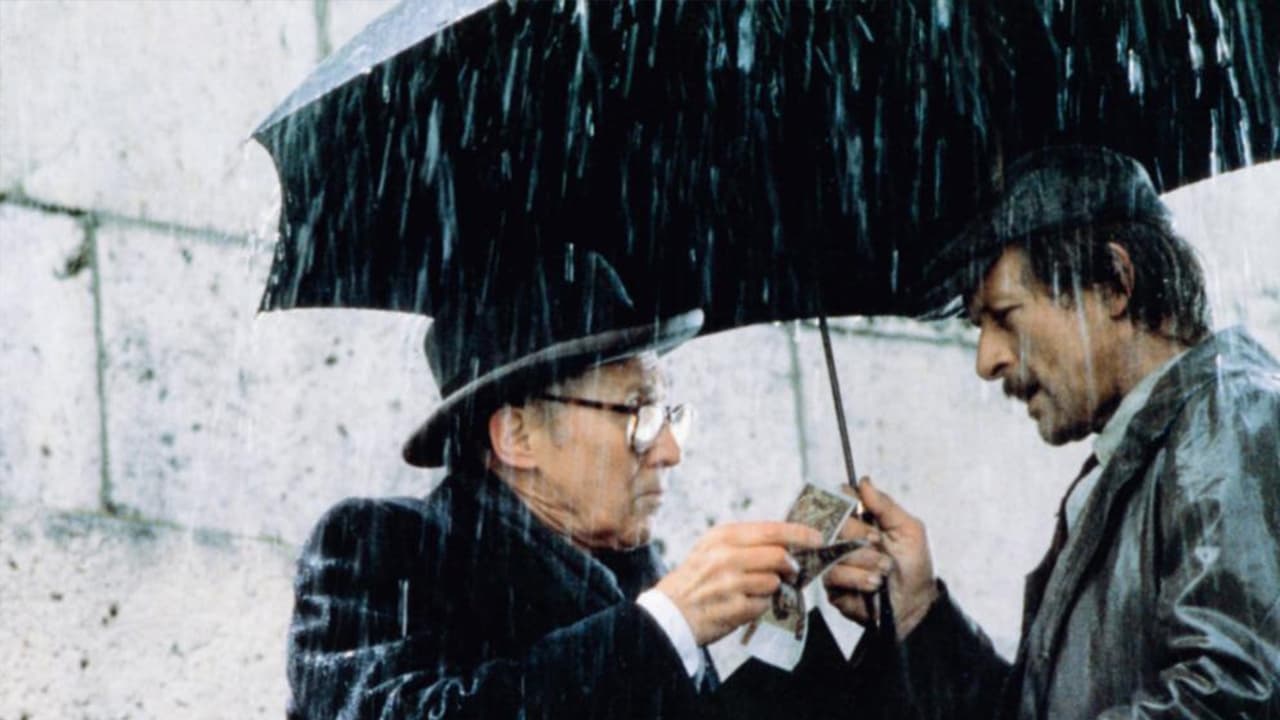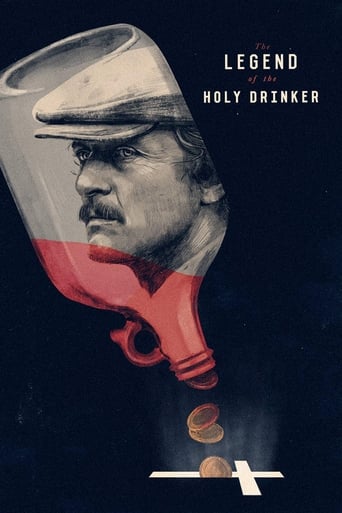Greenes
Please don't spend money on this.
ChicRawIdol
A brilliant film that helped define a genre
Plustown
A lot of perfectly good film show their cards early, establish a unique premise and let the audience explore a topic at a leisurely pace, without much in terms of surprise. this film is not one of those films.
ChampDavSlim
The acting is good, and the firecracker script has some excellent ideas.
Martin Bradley
This tale of a tramp who is the recipient of the milk of human kindness but who finds it difficult to repay the goodness shown to him is typical of its director, Ermanno Olmi, but whereas other Olmi films deal with the common-place with an uncommon beauty this tale of the mystical is overtly simplistic. "The Legend of the Holy Drinker" is visually superb and we should expect nothing less from an Olmi picture but it is also very dry, very dull and very unevenly acted, (the partial dubbing of its international cast certainly doesn't help).As the tramp Rutger Hauer staggers around looking a little too bewildered at what's happening to him and the supporting cast are fundamentally just bit players in his far from interesting story. The Stravinsky score also sits somewhat uneasily on proceedings. Some people think this is a masterpiece while others have simply dismissed it. Personally I found it a crashing bore.
gavin6942
A drunken homeless man (Rutger Hauer) in Paris is lent 200 francs by a stranger (Anthony Quayle) as long as he promises to repay it to a local church when he can afford to; the film depicts the man's constant frustrations as he attempts to do so.This project started when producer Roberto Cicutto (Hotel Rwanda) bought the rights to Roth's book of the same name. A few directors were approached and turned the film down because the plot was too "thin" and "vague". Finally, Ermanno Olmi (Tree of Wooden Clogs) was suggested by Tullio Kezich's wife, and he accepted. Perhaps because of modesty, Kezich suggests that Olmi wrote the bulk of the script, with Kezich merely "watching him work". Kezich is best known as the film critic for Corriere della Sera and for his award-winning biography of director Federico Fellini.According to Kezich, Robert DeNiro wanted the lead role, and Cicutto flew him to Europe to meet with Olmi. DeNiro was in awe of Olmi, but apparently the feeling was not mutual. Oddly, Rutger Hauer was wanted by Olmi because of his role in "The Hitcher" (1986), which makes little sense. Hauer himself concedes that he was more comfortable with action, and less comfortable with nuance.In fact, Hauer was probably a better choice than DeNiro, despite the latter's bigger star power. Hauer is quite effective as the alcoholic, not overdoing it. The way he is dressed and presents himself makes the "holy drinker" an interesting character because on the surface he appears quite well-to-do when, in fact, he sleeps under a bridge.Worth noting is Anthony Quayle, who has a small but important part, as he really commands attention from the audience just with his presence. Unlike Hauer, Quayle was primarily a stage actor, steeped in Broadway and Shakespeare. This may be why he so naturally comes off as "distinguished" because he certainly was.The film won the Golden Lion at the 45th edition of the Venice Film Festival. It also won four David di Donatello Awards (for best film, best director, Best cinematography and best editing) and two Silver Ribbons (for best director and best screenplay). The film was selected as the Italian entry for the Best Foreign Language Film at the 61st Academy Awards, though it was not accepted as a nominee.This mysterious tale -- almost a dark, dry comedy -- really comes to life on the Arrow Blu-ray. The special features are fairly slim, though the 25-minute interview with Kezich is enlightening and the 10-minute interview with Hauer is a joy. The best thing about this film is that it is now going to be available to a new audience. Though not well-known, it ought to be. In this reviewer's humble opinion, "Holy Drinker" is superior to "Tree of Wooden Clogs", and may be Hauer's finest role.
Andy B.
In the late 80s, Rutger Hauer had appeared in a string of wonderful and engaging movies. 'Escape From Sobibor', 'Bloodhounds Of Broadway', and 'On A Moonlit Night', all surpassed the level of workmanship found in his more action orientated movie's for which he'd become most well known for. 'Legend Of The Holy Drinker' arguably out shines all of the above film's, a laudable triumph, and one that sees Rutger Hauer deliver his finest performance of what has been a wonderful career. Hauer play's a street hobo called 'Andreas Kartak', an alcoholic who appears to be getting on with the grim task of being addicted to alcohol and being homeless. One day, a mysterious old man give's Andreas 200 francs, on the understanding that he repay his debt to the local Church when he is able to do so. What ensue's is a deeply symbolic and religious film that is acted with haunting perfection by the whole cast, with Hauer leading by example with an enchanting depiction of the alcoholic hobo. Set in an unknown era in Paris, the film itself is stunning to look at, with superb direction from veteran director Ermanno Olmi. Often movies are described as 'masterpieces', and in this case, the description is accurate. Other notable appearances include Anthony Quayle, Sandrine Dumas and french character actor Dominique Pinon. If you haven't seen 'Legend Of The Holy Drinker' i implore you to seek out a copy, it will not disappoint.
jordiainaud
Olmi is one of Europe's last Old Masters in the art of film making. He is usually regarded as a belated neo-realist, but after you've seen "The Legend of the Holy Drinker", you will realize the label simply does not stick. This is a film about spirituality, about communion, one of the most deeply religious movies ever, whose only rivals might be Dreyer's "Ordet" or Bergman's rather pretentious "faith trilogy" ("Through a Glass Darkly", "Winter Light" and "The Silence"). However, you will not find Scandinavian mists or angst in Catholic Olmi's adaptation of the beautiful novella written, oddly enough, by a great Jewish novelist, Joseph Roth. Wine is a metaphor for life, and Paris is a metaphor for our urban world. In this symbolic universe, it takes a great actor to give flesh and blood to the character of Andreas, the holy drinker, a beggar endowed with an amazing sense of dignity. Rutger Hauer was the man for the job: this was his best performance: he was never better, and, to judge from the course his career has taken, I fear he will never be better than in this film. It is not a thriller, but it is thrilling. It takes its own leisurely pace, but goes very far, very deep indeed into the human soul. After so many insipid or unpalatable cinematic concoctions, treat yourself to this film: it truly is vintage stuff.

